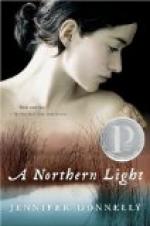“Well, this almost passes belief,” exclaimed the head forester angrily. “We did not force you; you could have said no, either of you, if you had desired.”
“Well, we do it now,” Willibald answered, so decidedly and quickly that his uncle looked at him quite bluffed. “Toni sees as well as I that a mere marriage by arrangement is not right, and when one has felt the bliss of loving he must marry the object of that love and no other.”
Frau von Eschenhagen, who had recovered her breath by this time, felt the sting of these last words. It had not entered her thoughts that one betrothal had been broken in order that another might be arranged, but now the fearful possibility struck her.
“Marry;” she repeated, “who would you marry? Would you marry that Marietta, that creature—”
“Mother, you must learn to speak of my future wife in a different tone—” said her son, in so earnest and decided a manner that the enraged woman was dumbfounded. “As Toni has released me, I am at liberty to love Marietta, and Marietta’s character is blameless, of that I have had proof. Who vexes or insults her must answer to me—even if it be my own mother.”
“See, see, the boy’s getting on bravely,” cried the head forester, whose sense of justice overcame for the moment his anger. But Frau von Eschenhagen was far removed from any instinct of justice. She had believed that her mere presence would have subdued her son, and now he defied her in this manner. His very appearance was different, and this enraged her the more for she realized how deep and strong was the feeling which could thus have changed him.
“I will spare you the trouble of calling your own mother to account,” she said with intense bitterness. “You are of age and are the heir of Burgsdorf, and I cannot prevent you doing as you choose. But on the day when you bring Marietta Volkmar to Burgsdorf—I leave it.”
The threat had its effect; Willibald moved back a step as he said excitedly:
“Mother, you are speaking in anger.”
“I speak in full earnest. As soon as an actress enters that house as mistress, where I have lived and ruled in honor for thirty years, and where I had hoped to lay my head down for my last, long sleep, I leave it forever. So take her to Burgsdorf if you wish—you have your choice between your mother and the actress.”
“But Regine, don’t be so unreasonable,” remonstrated Schoenau. “You should give the poor fellow some chance and not leave him such a hard choice.”
Regine did not heed his remonstrance, she stood there, white to the very lips, her eyes fixed upon her son. She repeated impressively:
“Decide which it shall be—she or I.”
Willibald had grown pale, too, and an expression of deep pain lay on his face as he said gently: “That is hard, mother. You know how dearly I love you, and what a grief it will be to me if you should leave me. But if you are so cruel as to leave me no option, then,” he straightened himself and finished with great decision, “then I choose Marietta.”




